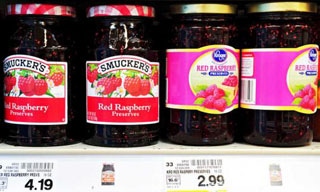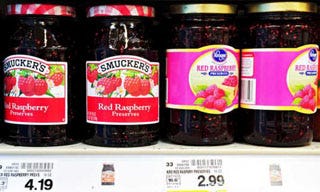March 11, 2015

By LaTina Emerson, The Augusta Chronicle, Ga.
Kathy Hayes, of Augusta, likes buying store-brand goods.On Wednesday, Hayes purchased Kroger's brand of canned goods, cheese and pizza. She saves about 20 percent on her grocery bill by purchasing the store brand, she said.
Sometimes, national brands are cheaper if there's a sale, but she usually finds the best prices on store-brand items. She doesn't have much time to clip coupons to get deals on national brands, and she doesn't need to buy in large quantities, which many coupons require, she said.

Private brand
Store brands soon might not be so cheap, though. Those goods could increase in price to compensate for the costs of packaging and improvements, said Sue Perry, the deputy editor at ShopSmart Magazine. "That is going to be passed on to the consumer. You might see the store brands creeping up in price," Perry said.
In the past, shoppers could save up to 50 percent when they purchased store brands. Now, the savings are, on average, about 30 percent. Consumers can't simply assume that store brands are always cheaper, Perry said.
"That's why you really have to be vigilant and do the unit pricing," she said. "Do the comparison pricing and see if that store brand is really going to save you money. It used to be across the board that we could say safely that it did."
Corporate officials at Wal¬mart declined to comment but sent an e-mail saying that it is Walmart's "goal to have low prices every day." Representatives at Bi-Lo and Publix said the stores do not anticipate an increase in prices.
"Bi-Lo doesn't have any plans to increase the prices of its private-label store brands," said Todd Rogers, the manager of advertising communication.
Publix redesigned its private-label packaging about four years ago, said Brenda Reid, the media and community relations manager.
"We created a clean look utilizing white space. That allows our products to stand out in the midst of very colorful national brands," Reid said. "We have not raised our prices as a result of the redesign. We were able to gradually replace labels on our private-label products so that we would not incur additional costs. The old labels were phased out as the new ones were introduced."
Packaging costs are typically a small percentage of the total cost, Reid added. Publix was among the first to create a system for a private-label brand that featured the retailer's name, rather than mimicking national-brand looks.
If there has been a price increase in the market, Reid said, it is related to external conditions, such as the economy, fuel prices or weather conditions.
Glynn Jenkins, the director of communications and public relations for The Kroger Co.'s Atlanta division, said he cannot speculate on commodity increases.
"Certainly our customers recognize and appreciate the quality and value of our comprehensive store brands," Jenkins said. "We leverage our manufacturing and procurement capabilities to really innovate and provide items that provide value for customers. We continue to try to keep price increases to an absolute minimum."
He said fuel-price increases could have some effect on food prices, "but to speculate would be misleading at this time."
Phillip Williams Jr., of Augus¬ta, was shopping at Kroger and said that he buys more store-brand goods because they're usually cheaper but that he will purchase national brands if he finds a bargain.
"I always end up with a lot more store brands. Sometimes, you get a store brand that's more expensive than the name brand, if it's on sale," Williams said. "The quality of the food in the store brand is just as good as the stuff that's coming from the name brand, maybe minus a few key ingredients here and there. It's just better quality than what you used to get, so why not?"
ShopSmart is compiling data of store-brand prices, but the results are not complete, Perry said.
If store brands become more expensive, it won't bother Karen Green, a coupon expert for North Augusta Today. The coupon clipper said she is able to purchase national-brand goods cheaper because she has coupons and buys them when they're on sale.
"The only time I ever use store brands is if I'm completely out of something and I can't get it cheaper," she said. "Most of the time, I stock up enough where I don't have to do that."
Green said she has seen little difference between store- and national-brand items, except for ketchup and condensed soups. "A lot of times, they're manufactured on the same line, just a different name put on it," she said.
___
(c)2012 The Augusta Chronicle (Augusta, Ga.)
About the Author(s)
You May Also Like


